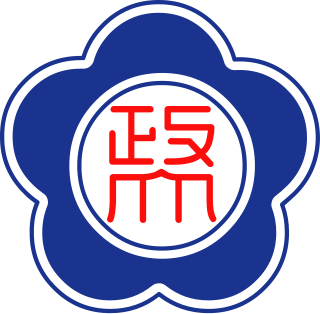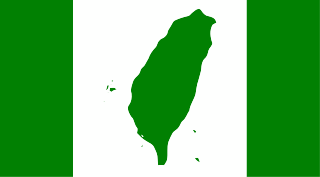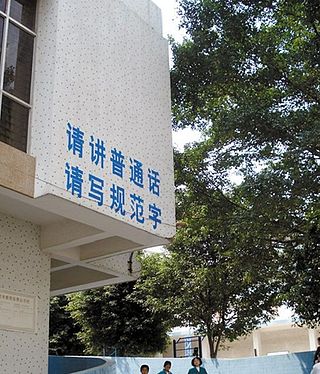
Standard Chinese is a modern standard form of Mandarin Chinese that was first codified during the republican era (1912‒1949). It is designated as the official language of mainland China and a major language in the United Nations, Singapore, and Taiwan. It is largely based on the Beijing dialect. Standard Chinese is a pluricentric language with local standards in mainland China, Taiwan and Singapore that mainly differ in their lexicon. Hong Kong written Chinese, used for formal written communication in Hong Kong and Macau, is a form of Standard Chinese that is read aloud with the Cantonese reading of characters.

Taiwanese Hokkien, or simply Taiwanese, also known as Taiuanoe, Taigi, Taigu, Taiwanese Minnan, Hoklo and Holo, is a variety of the Hokkien language spoken natively by more than 70 percent of the population of Taiwan. It is spoken by a significant portion of those Taiwanese people who are descended from Hoklo immigrants of southern Fujian. It is one of the national languages of Taiwan.

Zhongzheng District is a district in Taipei, Taiwan. Taipei Main Station is located in the district. It is home to most of the national government buildings of Taiwan.

National Taiwan Normal University is a national comprehensive university in Taipei and New Taipei City, Taiwan. The university's predecessor was a normal university.

The Chinese Culture University is a private Taiwanese university located in Yangmingshan in Shilin District, Taipei, Taiwan. Established in 1962, CCU is one of the largest universities in Taiwan with an enrollment of about 32,000 students. Satellite campuses are located in the Jianguo, Ximending, and Zhongxiao East Road areas of Taipei City.

National Chengchi University is a public research university in Taipei. The university is also considered as the earliest public service training facility of the Republic of China. First established in Nanjing in 1927, the university was subsequently relocated to Taipei and resumed full operation in 1954 as the first re-established "National University" in Taiwan.
Cantonese is the traditional prestige variety of Yue Chinese, a Sinitic language belonging to the Sino-Tibetan language family. It originated in the city of Guangzhou and its surrounding Pearl River Delta, and is currently spoken by over 82.4 million native speakers.
The educational system in Taiwan is the responsibility of the Ministry of Education. The system produces pupils with some of the highest test scores in the world, especially in mathematics and science. Former president Ma Ying-jeou announced in January 2011 that the government would begin the phased implementation of a twelve-year compulsory education program by 2014.

Taiwanese nationalism is a nationalist movement which asserts that the Taiwanese people are a distinct nation. Due to the complex political status of Taiwan, it is strongly linked to the Taiwan independence movement in seeking an identity separate from China. This involves the education of history, geography, and culture from a Taiwan-centric perspective, promoting native languages of Taiwan such as Taiwanese Hokkien, Hakka, and indigenous languages, as well as reforms in other aspects. Taiwanese nationalism was described as 'anti-imperialist' in that it opposed Japanese imperialism before 1945, opposed Chinese imperialism in modern times, and supported its own Taiwanese identity, which was distinct from China.

Radio Taiwan International is the English name and call sign of the Central Broadcasting System (CBS), national broadcaster and international radio service of Taiwan. It is a government-owned station that broadcasts in 14 languages around the world via the internet, shortwave and podcasts. It also has Facebook fan pages in five additional languages. The station’s hosts and programs have won many national and global broadcasting awards.
The International Chinese Language Program is an institution for intensive training in formal Mandarin, Taiwanese, Classical Chinese, and other varieties of Chinese. It is located in Gongguan, Taipei, on the main campus of National Taiwan University.

The languages of Taiwan consist of several varieties of languages under the families of Austronesian languages and Sino-Tibetan languages. The Formosan languages, a geographically designated branch of Austronesian languages, have been spoken by the Taiwanese indigenous peoples for thousands of years. Owing to the wide internal variety of the Formosan languages, research on historical linguistics recognizes Taiwan as the Urheimat (homeland) of the whole Austronesian languages family. In the last 400 years, several waves of Han emigrations brought several different Sinitic languages into Taiwan. These languages include Taiwanese Hokkien, Hakka, and Mandarin, which have become the major languages spoken in present-day Taiwan.

The National Socialism Association (NSA) is a neo-Nazi political organization in Taiwan, founded in August 2005 by participants of the online forum Taiwan Nazi. It received international attention in March 2007, following reports of its inaugural in-person meeting that month.

The Ministry of Education (MOE) is the ministry of Taiwan responsible for incorporating educational policies and managing public schools and it oversees the educational administrative agencies of local governments.
Articles related to Taiwan include:

The Taipei Language Institute was founded in 1956 by a group of missionaries who wished to provide training in Mandarin Chinese for Taiwan-bound missionaries. Originally named Missionary Language Institute, the founder Dr. Marvin Ho created the institute as a means of educating these foreigners in Mandarin and Taiwanese.
Mandarin Chinese is the primary formal Chinese language taught academically to students in Chinese Filipino private schools and additionally across other private and public schools, universities, and institutions in the Philippines, especially as the formal written Chinese language.

Protection of the varieties of Chinese refers to efforts to protect the continued existence of the varieties of Chinese in mainland China and other Sinophone regions, amid pressure to abandon their use, usually in favor of Standard Chinese. The Ministry of Education of the People's Republic of China has proclaimed to be taking active measures to protect ten varieties of Chinese. However, a large majority of the citizens of China speak a dialect of Mandarin Chinese, a standardized form of which has been enforced and promoted by the government of China for the last sixty years. The Constitution of the People's Republic of China calls on the government to promote Standard Chinese as the common tongue of the nation, but this policy has caused conflict to a certain extent with plans to preserve local varieties of Chinese. Education and media programming in varieties of Chinese other than Mandarin have been discouraged by the governments of the People's Republic of China, Singapore, and Taiwan. Teaching the varieties of Chinese to non-native speakers is discouraged by the laws of the People's Republic of China in favor of Putonghua. The Guangdong National Language Regulations were passed by the Guangdong provincial government in 2012 to promote the use of Standard Chinese in broadcast and print media at the expense of the local standard Cantonese and other related dialects. It has been labelled "pro-Mandarin, anti-Yue" legislation.
National Dong Hwa University Chinese Language Center is one of the most distinguished schools for Chinese as a second language study in Taiwan, which is run by National Dong Hwa University (NDHU) in Hualien, Taiwan. In 2019, NDHU CLC's students achieved 100% pass rate in TOCFL. In 2021, NDHU CLC founded two oversea Chinese language school at universities in the United States.












